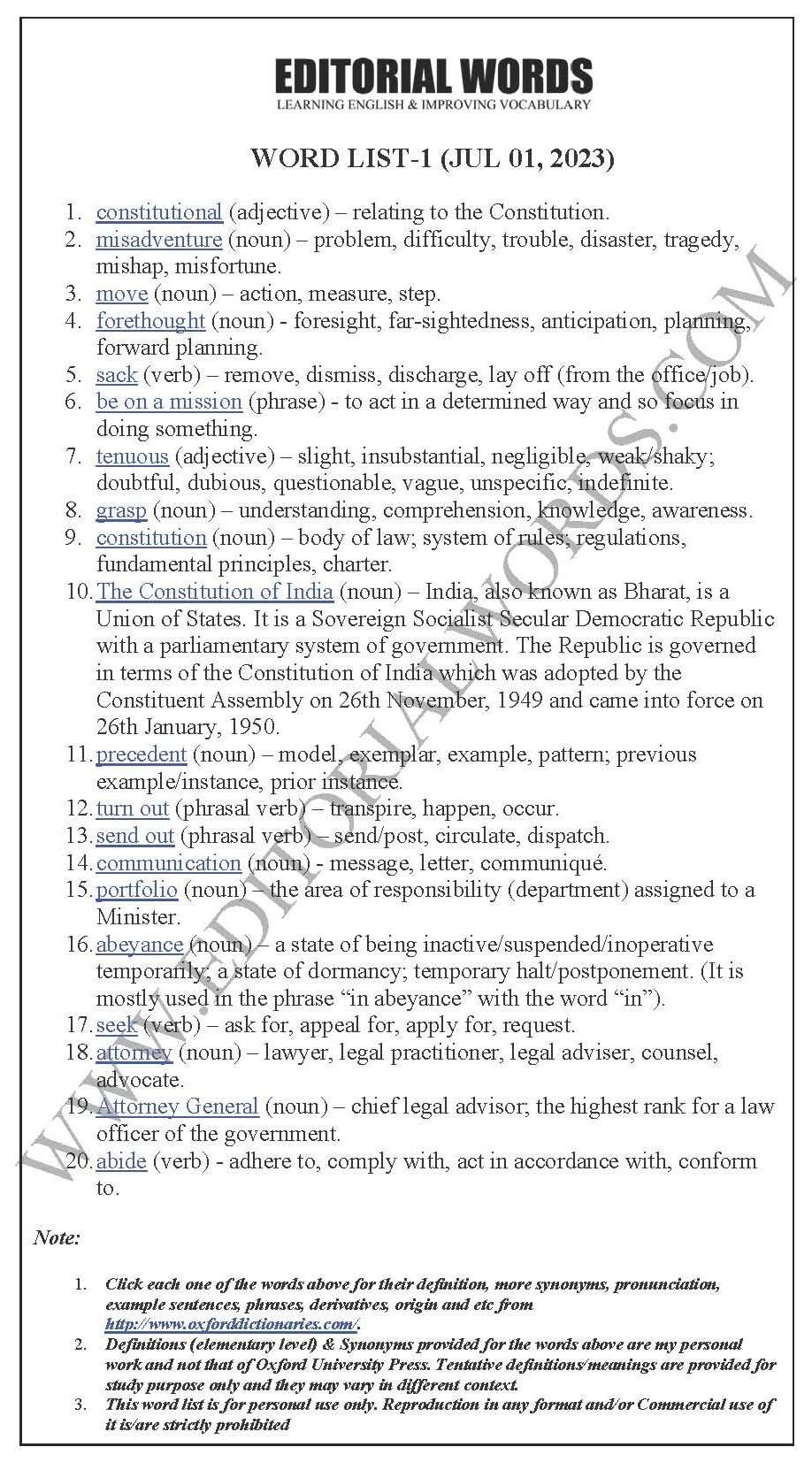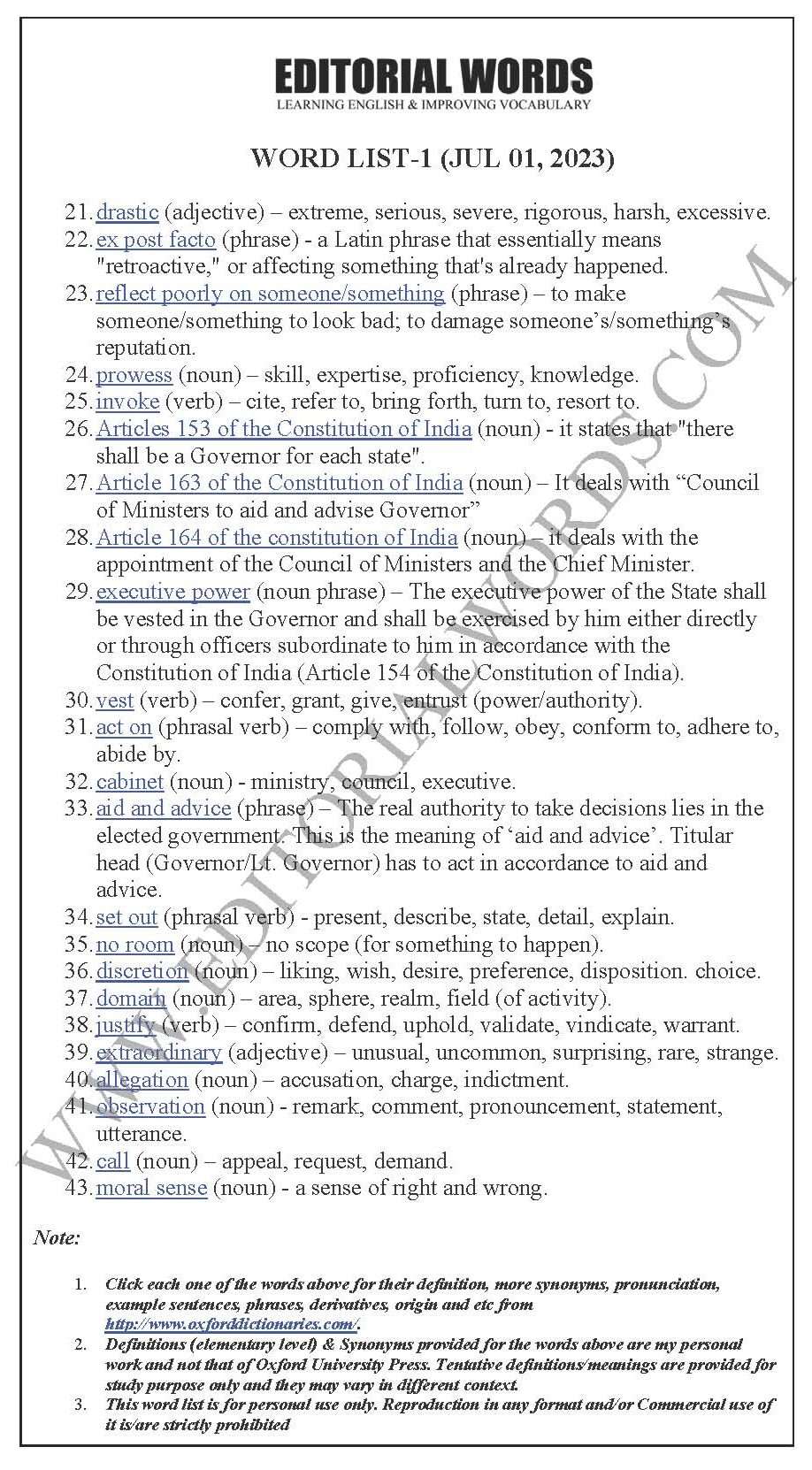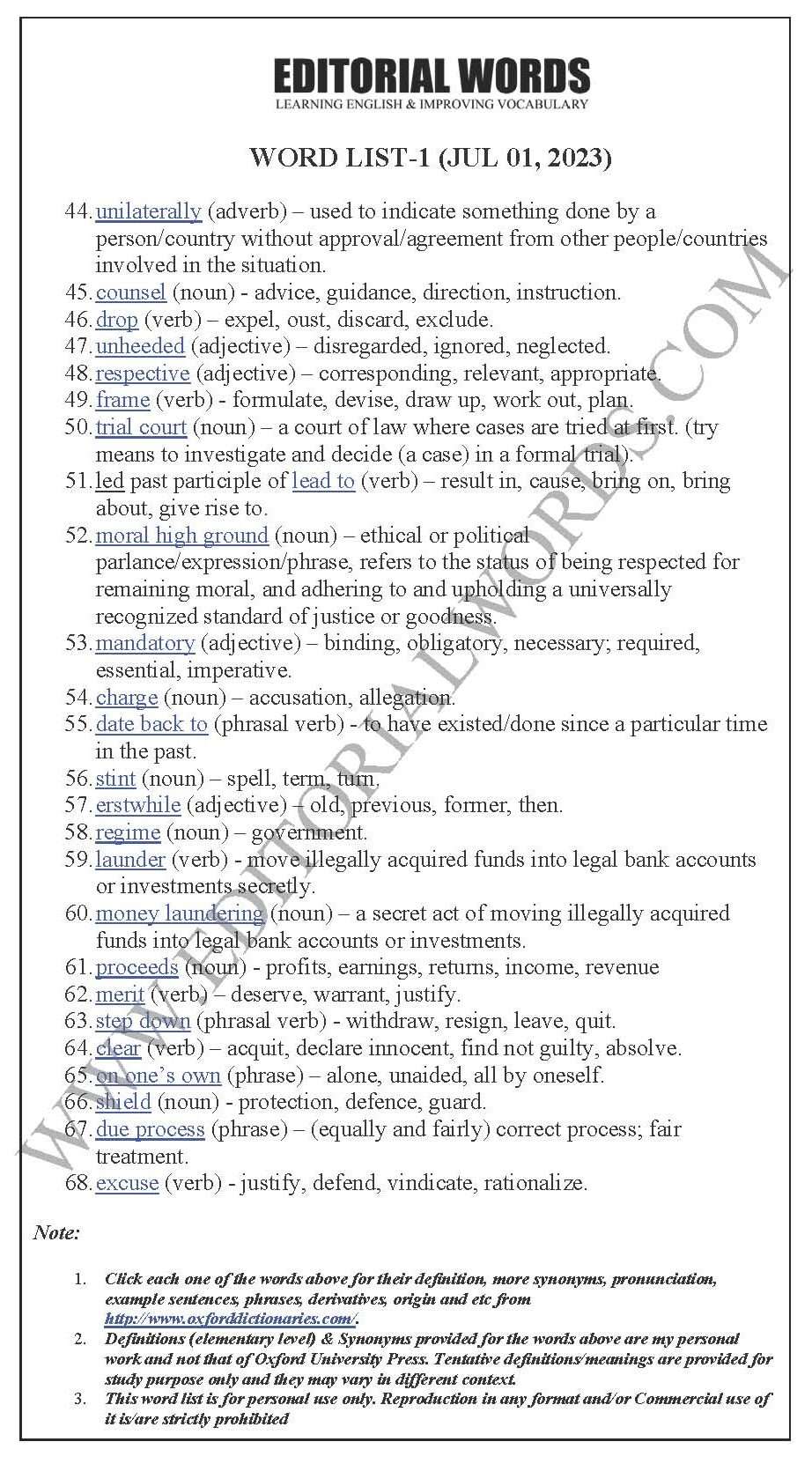The Hindu Editorial (Constitutional misadventure) – Jul 01, 2023
To read this article, click “The Hindu”.
This preview is provided here with permission.
Courtesy: The Hindu
The Hindu Editorial (Constitutional misadventure) – Jul 01, 2023:
- constitutional (adjective) – relating to the Constitution.
- misadventure (noun) – problem, difficulty, trouble, disaster, tragedy, mishap, misfortune.
- move (noun) – action, measure, step.
- forethought (noun) – foresight, far-sightedness, anticipation, planning, forward planning.
- sack (verb) – remove, dismiss, discharge, lay off (from the office/job).
- be on a mission (phrase) – to act in a determined way and so focus in doing something.
- tenuous (adjective) – slight, insubstantial, negligible, weak/shaky; doubtful, dubious, questionable, vague, unspecific, indefinite.
- grasp (noun) – understanding, comprehension, knowledge, awareness.
- constitution (noun) – body of law; system of rules; regulations, fundamental principles, charter.
- The Constitution of India (noun) – India, also known as Bharat, is a Union of States. It is a Sovereign Socialist Secular Democratic Republic with a parliamentary system of government. The Republic is governed in terms of the Constitution of India which was adopted by the Constituent Assembly on 26th November, 1949 and came into force on 26th January, 1950.
- precedent (noun) – model, exemplar, example, pattern; previous example/instance, prior instance.
- turn out (phrasal verb) – transpire, happen, occur.
- send out (phrasal verb) – send/post, circulate, dispatch.
- communication (noun) – message, letter, communiqué.
- portfolio (noun) – the area of responsibility (department) assigned to a Minister.
- abeyance (noun) – a state of being inactive/suspended/inoperative temporarily; a state of dormancy; temporary halt/postponement. (It is mostly used in the phrase “in abeyance” with the word “in”).
- seek (verb) – ask for, appeal for, apply for, request.
- attorney (noun) – lawyer, legal practitioner, legal adviser, counsel, advocate.
- Attorney General (noun) – chief legal advisor; the highest rank for a law officer of the government.
- abide (verb) – adhere to, comply with, act in accordance with, conform to.
- norm (noun) – standard, convention, regulation.
- drastic (adjective) – extreme, serious, severe, rigorous, harsh, excessive.
- ex post facto (phrase) – a Latin phrase that essentially means “retroactive,” or affecting something that’s already happened.
- reflect poorly on someone/something (phrase) – to make someone/something to look bad; to damage someone’s/something’s reputation.
- prowess (noun) – skill, expertise, proficiency, knowledge.
- invoke (verb) – cite, refer to, bring forth, turn to, resort to.
- Articles 153 of the Constitution of India (noun) – it states that “there shall be a Governor for each state”.
- Article 163 of the Constitution of India (noun) – It deals with “Council of Ministers to aid and advise Governor”
- Article 164 of the constitution of India (noun) – it deals with the appointment of the Council of Ministers and the Chief Minister.
- executive power (noun phrase) – The executive power of the State shall be vested in the Governor and shall be exercised by him either directly or through officers subordinate to him in accordance with the Constitution of India (Article 154 of the Constitution of India).
- vest (verb) – confer, grant, give, entrust (power/authority).
- act on (phrasal verb) – comply with, follow, obey, conform to, adhere to, abide by.
- cabinet (noun) – ministry, council, executive.
- aid and advice (phrase) – The real authority to take decisions lies in the elected government. This is the meaning of ‘aid and advice’. Titular head (Governor/Lt. Governor) has to act in accordance to aid and advice.
- set out (phrasal verb) – present, describe, state, detail, explain.
- no room (noun) – no scope (for something to happen).
- discretion (noun) – liking, wish, desire, preference, disposition. choice.
- domain (noun) – area, sphere, realm, field (of activity).
- justify (verb) – confirm, defend, uphold, validate, vindicate, warrant.
- extraordinary (adjective) – unusual, uncommon, surprising, rare, strange.
- allegation (noun) – accusation, charge, indictment.
- observation (noun) – remark, comment, pronouncement, statement, utterance.
- call (noun) – appeal, request, demand.
- moral sense (noun) – a sense of right and wrong.
- rather than (phrase) – instead of.
- unilaterally (adverb) – used to indicate something done by a person/country without approval/agreement from other people/countries involved in the situation.
- ground (noun) – reason, factor, basis, rationale, premise.
- counsel (noun) – advice, guidance, direction, instruction.
- drop (verb) – expel, oust, discard, exclude.
- unheeded (adjective) – disregarded, ignored, neglected.
- respective (adjective) – corresponding, relevant, appropriate.
- frame (verb) – formulate, devise, draw up, work out, plan.
- trial court (noun) – a court of law where cases are tried at first. (try means to investigate and decide (a case) in a formal trial).
- led past participle of lead to (verb) – result in, cause, bring on, bring about, give rise to.
- moral high ground (noun) – ethical or political parlance/expression/phrase, refers to the status of being respected for remaining moral, and adhering to and upholding a universally recognized standard of justice or goodness.
- mandatory (adjective) – binding, obligatory, necessary; required, essential, imperative.
- charge (noun) – accusation, allegation,.
- date back to (phrasal verb) – to have existed/done since a particular time in the past.
- stint (noun) – spell, term, turn.
- erstwhile (adjective) – old, previous, former, then.
- regime (noun) – government.
- launder (verb) – move illegally acquired funds into legal bank accounts or investments secretly.
- money laundering (noun) – a secret act of moving illegally acquired funds into legal bank accounts or investments.
- proceeds (noun) – profits, earnings, returns, income, revenue
- merit (verb) – deserve, warrant, justify.
- step down (phrasal verb) – withdraw, resign, leave, quit.
- clear (verb) – acquit, declare innocent, find not guilty, absolve.
- on one’s own (phrase) – alone, unaided, all by oneself.
- shield (noun) – protection, defence, guard.
- due process (phrase) – (equally and fairly) correct process; fair treatment.
- excuse (verb) – justify, defend, vindicate, rationalize.
Note:
1. Click each one of the words above for their definition, more synonyms, pronunciation, example sentences, phrases, derivatives, origin and etc from http://www.oxforddictionaries.com/.
2. Definitions (elementary level) & Synonyms provided for the words above are my personal work and not that of Oxford University Press. Tentative definitions/meanings are provided for study purpose only and they may vary in a different context.
3. This word list is for personal use only. Reproduction in any format and/or Commercial use of it is/are strictly prohibited.
The Hindu Editorial (Constitutional misadventure) – Jul 01, 2023:



“Phrasal Verbs” We Learnt Last Week
“Idioms & Phrases” We Learnt Last Week
“Important Definitions” We Learnt Last Week
Recent Word Lists For The Hindu Editorial Articles

Tamil Nadu Governor R.N. Ravi appears to be on a mission to demonstrate his tenuous grasp of the Constitution. In an action without precedent — and,… For further reading, visit “The Hindu”. Below is today’s word list-1 for The Hindu Editorial (Constitutional misadventure) – Jul 01, 2023.